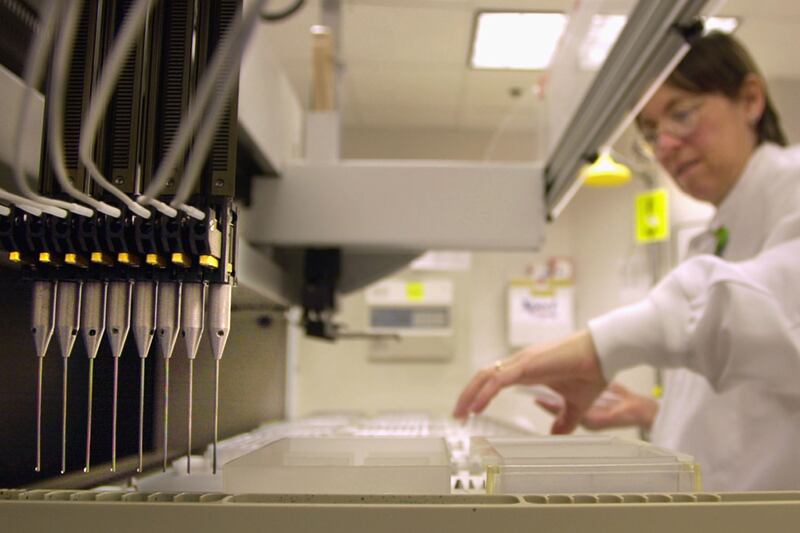Congratulations: you own your genes.
The Supreme Court has unanimously ruled that isolated human genes cannot be patented, because merely discovering something that occurs naturally cannot count as an invention. The ruling will have profound effects on medical research, genetic science, and the biotech industry.

“Myriad did not create anything,” wrote Justice Clarence Thomas, referring to the company that held patents on two genes linked to breast cancer. “To be sure, it found an important and useful gene, but separating that gene from its surrounding genetic material is not an act of invention.” Myriad had claimed that by “snipping” the relevant portions of the DNA, it had invented something not found in nature, an argument that seemed to puzzle the justices during oral arguments last month. Justice Elena Kagan asked whether that logic could result in someone patenting, for example, the human liver.
ADVERTISEMENT
The ruling is a boon to cancer researchers and genetic scientists. Studies show that between 20 and 40 percent of the human genome is patented by one company or another, making researchers wary of studying certain genes lest they get sued for intellectual property violations. Myriad in particular has been very aggressive about protecting its patents, sending cease-and-desist letters to researchers who tried to study the two BRCA genes, mutations of which are the largest known hereditary source of breast cancer. “Now people can do research,” says Dr. Jeffrey Rosenfeld an assistant professor of medicine at the New Jersey Medical School and a research associate at the Sackler Institute for Comparative Genomics. “You’re not limited by what gene you can work on.”
It’s also good news for anyone who wants to know whether they’re at risk for cancer. Myriad’s patents prevented other companies from running tests on the BRCA genes, meaning that it could charge over $3,000 for its breast cancer test. Angelina Jolie brought attention to Myriad’s monopoly when she pointed out the high cost of the test that prompted her to get a double mastectomy. The ruling may not cause the cost of Myriad’s own test to drop immediately because some of its relevant patents aren’t affected, but it will free up other laboratories to develop similar tests, driving down the cost. In 2010 researchers at the University of Washington developed a cancer test that looked at 40 genes, but had to remove the two BRCA genes because of Myriad’s patents; now they could include them in a comprehensive scan, doing away with the need for multiple, confusing tests. It will also allow women to get second opinions, something that Myriad’s monopoly prevented. Rosenfeld puts it bluntly: “You could say people are dying of breast cancer because of this patent.”
The decision wasn’t a total defeat for Myriad Genetics, however—the court left the door open to the possibility that a synthetic type of DNA called cDNA could be eligible for patenting, a split decision thatsent Myriad’s stock soaring. Myriad focused on the cDNA part of the ruling. “We believe the court appropriately upheld our claims on cDNA, and underscored the patent eligibility of our method claims, ensuring strong intellectual property protection for our BRACAnalysis test movingforward,” said CEO Peter Meldrum. This type of synthetic DNA is produced by making a copy of mRNA, the single-stranded molecules that act as a messenger between DNA and the proteins that express the DNA, and splicing them into a double-stranded DNA-like molecule. “The lab technician questionably creates something new when cDNA is made,” Thomas wrote, though he mentioned in a footnote that the court wasn’t actually ruling on whether cDNA could be patented. That means cDNA might still be eligible for patents, preserving an incentive for biotech companies that base a large part of their research on cDNA.
However, a cDNA patent would still have to show that its invention is “non-obvious,” says Matthew Dowd, the lawyer who filed an amicus brief on behalf of James Watson, who won a Nobel Prize for his co-discovery of the structure of DNA. “If you have human genes you almost necessarily have cDNA,” says Dowd. “Down road will be battles over whether cDNA is non-obvious.”
Overall, Dowd is pleased with the decision. Watson was traveling and unavailable for comment, but Dowd said that he’ll be happy to learn that the court agreed with his view that human genes shouldn’t have been patented. “This year is the 60th anniversary of Watson and Crick’s discovery of the DNA helix, the 10th anniversary of sequencing of the human genome,” Dowd pointed out. “From his perspective it’s great that court affirmed his belief human genes should not be monopolized with a patent.”






